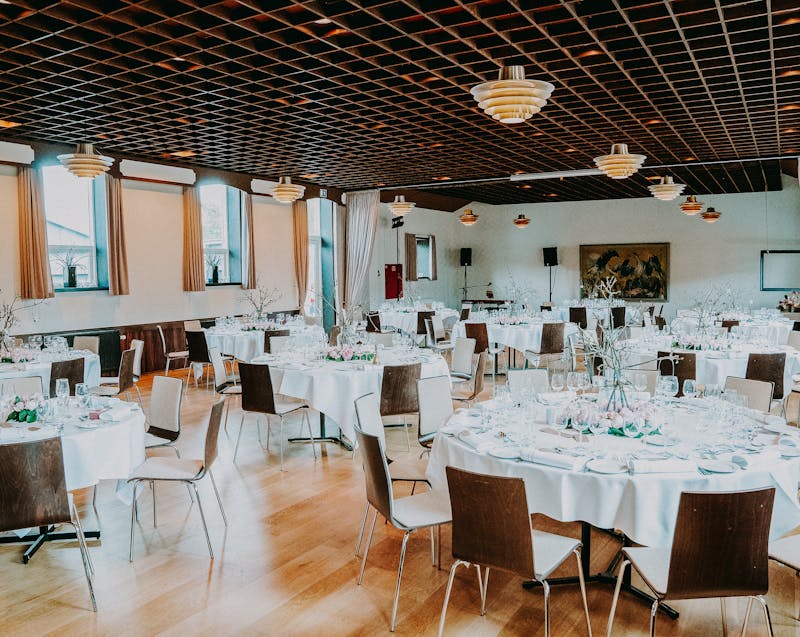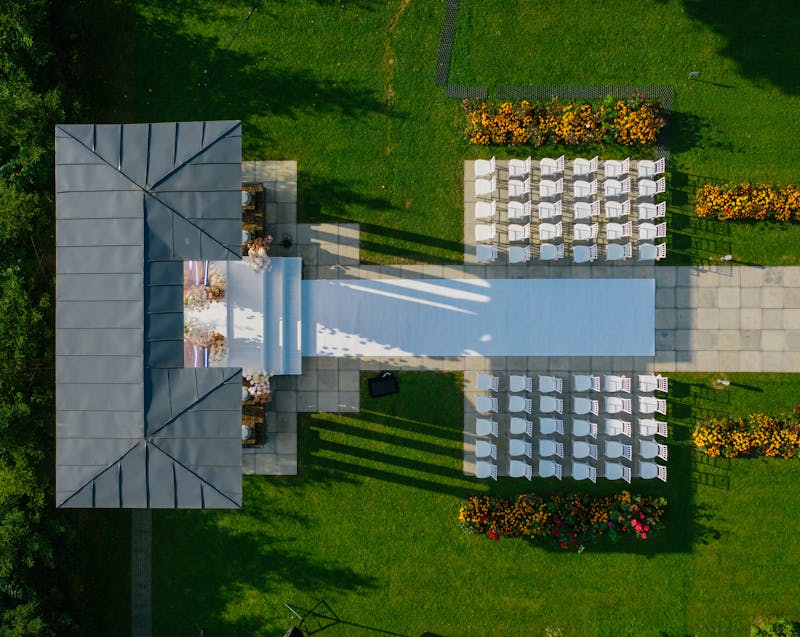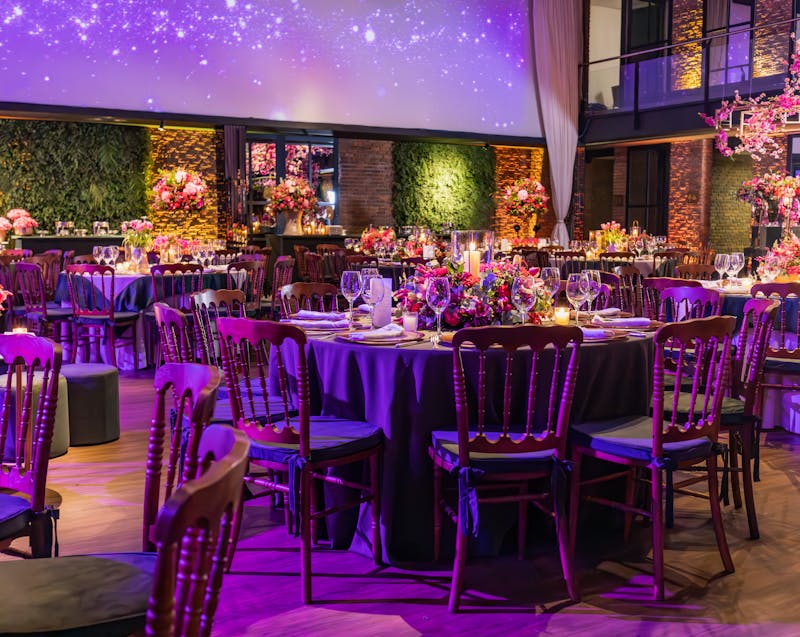- Match the venue to your event’s purpose and audience. The space should reflect the tone, layout, and functionality your event requires.
- Set a clear and realistic budget early. Account for hidden costs, package deals, and off-peak discounts to avoid overspending.
- Prioritize accessibility and location. Choose venues that are easy to reach, have adequate parking, and are comfortable for all guests.
- Evaluate layout, amenities, and technical support. Look for adaptable floor plans, modern AV systems, and on-site staff to streamline logistics.
- Review contracts and policies carefully. Understand cancellation terms, vendor restrictions, and insurance requirements before signing.
- Visit multiple venues before booking. A site inspection helps you compare options and ensure the space aligns with your vision.
- Book early and plan ahead. Securing your venue in advance guarantees availability, better rates, and smoother coordination.
Selecting the right venue can make or break your event. Whether you’re planning a wedding, corporate meeting, product launch, or birthday celebration, the event space sets the tone for everything — from the first impression your guests get to how comfortable and enjoyable the experience feels. While many people focus on themes and decorations, the truth is that the foundation of a successful event begins with finding the perfect location.
This guide provides an in-depth look at how to choose an event space that fits your goals, budget, and guest experience. From determining your priorities to reviewing contracts, every detail matters when it comes to creating a seamless event.
- Understanding the Purpose and Type of Event
- Determining Your Budget
- Location, Accessibility, and Parking
- Capacity, Layout, and Flow
- Amenities and On-Site Facilities
- Style, Atmosphere, and Flexibility of the Venue
- Catering and Food Options
- Technical Requirements and Event Support
- Reviewing Policies, Contracts, and Insurance
- Scheduling Site Visits and Comparing Options
- Booking Early and Planning Ahead
- The Role of Research and Reviews
- Conclusion
Understanding the Purpose and Type of Event
The first step in selecting a venue is identifying the purpose and tone of your event. Every occasion demands a specific atmosphere, layout, and functionality — what works for a business seminar may not suit a wedding reception.
When you know your event’s objectives, you can easily narrow down your choices. For instance:
- Corporate events: Look for venues that offer a professional environment with strong Wi-Fi, audio-visual equipment, and breakaway rooms for discussions. Accessibility and proximity to transportation hubs are key.
- Weddings: Ambiance takes center stage. Choose a venue that reflects your theme — from modern minimalist halls to charming outdoor gardens.
- Social gatherings: Birthday parties or reunions benefit from flexible layouts, casual settings, and built-in entertainment options.
- Conferences and workshops: Opt for event spaces with stage areas, microphones, and large screens for presentations. Ample seating and smooth traffic flow are essential.
Matching the venue’s facilities to your event’s goals ensures the environment supports, rather than hinders, your plans.
Determining Your Budget
Your budget is one of the most decisive factors in choosing an event space. Setting a clear budget early helps you filter options and avoid costly surprises later. Keep in mind that venue pricing often covers more than just the physical room — it can include furniture, setup, and cleanup services, and even technical support.
Here’s what to consider when budgeting:
- Base rental fee: This is the starting point, but many venues also charge separately for utilities or setup.
- Hidden costs: Always ask about service fees, corkage, security deposits, and overtime charges.
- Package deals: Some venues offer bundled options that include catering, décor, or entertainment, which can help you save.
- Timing discounts: Booking during off-peak seasons or weekdays often leads to significant savings.
Pro tip: Allocate about 20% of your budget for unexpected expenses such as last-minute décor or equipment needs. A well-planned budget gives you flexibility while keeping spending under control.
Location, Accessibility, and Parking
The location of your event space can greatly influence attendance and guest satisfaction. A convenient and accessible venue is one that guests can easily reach, regardless of where they’re coming from.
When evaluating locations, consider the following factors:
- Proximity: The venue should be close to public transportation, hotels, or major roads. For out-of-town guests, nearby accommodations are a plus.
- Accessibility: Ensure the venue is wheelchair-friendly and complies with accessibility requirements.
- Parking: Look for venues with adequate parking or partnerships with nearby lots. Valet services can also elevate the guest experience.
- Safety and surroundings: A clean, well-lit, and secure environment creates comfort and confidence among attendees.
For destination events, provide guests with directions, shuttle options, and digital maps. Convenience is one of the top reasons attendees show up on time — or at all.
Capacity, Layout, and Flow

Matching your expected guest count with a venue’s capacity is non-negotiable. An event space that’s too small can make guests feel cramped, while one that’s too large might look empty and impersonal.
Here’s how to make sure your layout enhances the experience:
- Check fire and safety regulations: Never exceed the venue’s maximum capacity.
- Choose adaptable layouts: Look for venues that can accommodate different setups like theater, classroom, or banquet styles.
- Consider movement flow: Guests should be able to move comfortably between entry points, restrooms, food stations, and the main activity areas.
- Account for special zones: Include areas for registration, networking, or entertainment if needed.
For networking events or product launches, a spacious floor plan encourages mingling and interaction, while formal gatherings may benefit from a more structured seating arrangement.
Amenities and On-Site Facilities
Modern event planning requires more than just tables and chairs. The right amenities can streamline logistics and elevate the overall experience.
Look for venues that offer:
- Audio-visual equipment: Projectors, microphones, and sound systems are essential for corporate and entertainment events alike.
- Strong Wi-Fi connection: Especially crucial for conferences, live streaming, and hybrid events.
- Catering facilities: A kitchen or on-site catering team simplifies meal service and ensures quality control.
- Lighting and sound systems: Adjustable lighting helps set the mood, while good acoustics ensure everyone hears clearly.
- Restrooms and storage areas: These should be easily accessible and sufficient for the number of guests.
- On-site staff: Support teams, maintenance personnel, and security staff add professionalism and safety.
Venues that offer comprehensive amenities often reduce the need for external vendors, saving both time and money.
Style, Atmosphere, and Flexibility of the Venue
The look and feel of an event space are equally as important as its logistics. The venue should reflect your event’s purpose and desired atmosphere.
Consider the following when evaluating style and ambiance:
- Theme compatibility: Whether it’s a romantic wedding, sleek corporate event, or festive celebration, the venue’s décor should align with your theme.
- Indoor vs. outdoor: Outdoor venues provide natural lighting and open spaces, while indoor venues offer controlled environments ideal for year-round events.
- Flexibility in decoration: Ensure the venue allows customization so you can add personal touches through lighting, floral arrangements, or furniture setup.
- Aesthetic appeal: Neutral backdrops, elegant architecture, or scenic views can enhance photographs and elevate the overall experience.
The right ambiance creates a lasting impression, and venues with flexible design options allow you to transform a blank canvas into something unique and memorable.
Catering and Food Options
Food often ranks among the top considerations for guests, making catering a crucial aspect of your venue selection. Whether you’re planning a formal dinner or a casual buffet, the catering service must align with your event’s theme and audience preferences.
When evaluating catering options, keep these in mind:
- In-house vs. external catering: Some venues have exclusive in-house caterers, while others allow external vendors. Confirm the policy before signing a contract.
- Menu customization: Ensure flexibility for dietary restrictions such as vegetarian, vegan, gluten-free, or halal options.
- Service style: Choose between plated service, buffets, or food stations depending on the event type and schedule.
- Tasting sessions: Always request a tasting before finalizing the menu to ensure quality and presentation meet expectations.
Excellent catering isn’t just about taste — it’s about timing, presentation, and the ability to serve all guests efficiently.
Technical Requirements and Event Support
Technology plays an increasingly vital role in modern events, especially with the rise of hybrid gatherings that combine in-person and virtual participation.
Evaluate each venue’s technical infrastructure by asking about:
- Internet speed and stability: Crucial for live streaming, digital presentations, and online interactions.
- Audio-visual setup: Check for projectors, LED screens, microphones, and speakers.
- Lighting control: Adjustable lighting helps set different moods for various program segments.
- Power outlets and backup: Ensure there are enough outlets and backup generators for uninterrupted service.
- Technical support: On-site technicians can handle unexpected glitches quickly and efficiently.
Venues that are technologically equipped make hosting large-scale events smoother, helping organizers maintain professionalism throughout the program.
Reviewing Policies, Contracts, and Insurance
Before signing any contract, take the time to review every clause carefully. Overlooking fine print can lead to costly misunderstandings later.
Here’s what to check:
- Cancellation policies: Understand refund terms and deadlines for rescheduling or cancellation.
- Liability coverage: Confirm who’s responsible for damages, injuries, or unforeseen incidents.
- Setup and teardown times: Make sure there’s enough time allocated before and after the event.
- Vendor restrictions: Some venues have exclusive partnerships with caterers or decorators.
- Insurance requirements: Certain venues require proof of event insurance from the organizer.
If possible, consult a legal or event professional before finalizing agreements. Clear communication ensures that both parties understand their responsibilities, preventing confusion and disputes.
Scheduling Site Visits and Comparing Options

Even the most beautiful photos or virtual tours can’t replace a physical visit. A site inspection helps you assess the venue’s true condition, layout, and suitability.
During your visit, observe and ask about:
- Cleanliness and maintenance: A well-kept venue reflects professionalism and care.
- Lighting and acoustics: Natural light and sound control greatly affect ambiance.
- Temperature control: Ensure the space has reliable air conditioning or heating.
- Furniture and facilities: Confirm that tables, chairs, and equipment meet your needs.
- Flow and spacing: Walk through the areas where guests will enter, sit, and move around.
Take photos and detailed notes so you can compare options later. If you’re evaluating multiple venues, create a checklist of essential features to identify which one offers the best value.
Booking Early and Planning Ahead
Popular event spaces can get booked months in advance, especially during peak seasons. Booking early gives you more choices and potentially better rates.
When booking, consider the following strategies:
- Secure your preferred date early: This also allows enough time for planning logistics, vendors, and invitations.
- Confirm all details in writing: Keep a record of what’s included in your package — from setup times to catering services.
- Have a backup plan: Weather, cancellations, or emergencies can disrupt even the best-laid plans.
- Communicate regularly: Stay in touch with your venue coordinator to confirm updates and adjustments.
A proactive approach not only prevents last-minute stress but also gives you peace of mind knowing your venue is secured and ready.
The Role of Research and Reviews
Reading testimonials and exploring user reviews can offer valuable insights into a venue’s reliability and service quality. Websites and forums often list feedback about amenities, staff responsiveness, and overall guest experience.
Additionally, look into curated lists such as guides featuring the top 10 event spaces in your area. These resources highlight venues that have consistently received positive reviews and recommendations from event organizers and guests. Researching the best-rated or most popular spaces can help you identify venues that align with your expectations in terms of quality, flexibility, and customer service.
While such lists of top ten event spaces are helpful starting points, always follow up with your own inspection to ensure the space meets your specific requirements.
Conclusion
Choosing the perfect event space takes time, planning, and attention to detail. From understanding your event’s purpose to managing your budget and reviewing contracts, every factor contributes to the overall success of your gathering.
A well-chosen venue enhances guest comfort, reflects your event’s theme, and simplifies logistics. Whether you’re exploring luxurious ballrooms, cozy outdoor gardens, or modern conference halls, focus on how each option aligns with your goals and audience.
As you explore the top 10 event spaces in your city or region, remember that the ideal venue isn’t just about looks — it’s about functionality, service quality, and the ability to bring your vision to life. With careful planning and research, you can find a space that transforms your event from ordinary to unforgettable.
